Early Childhood Education: Motor Skills, Reflexes, and Development
VerifiedAdded on 2023/01/11
|6
|1523
|54
Report
AI Summary
This report delves into the realm of early childhood education, specifically concentrating on the development of motor skills and perceptual abilities in infants and toddlers. It meticulously outlines the gross and fine motor skills observed in children aged 0-12 and 12-24 months, highlighting key milestones such as grasping, crawling, walking, and the development of perceptual abilities including vision, taste, and sound recognition. The report also examines the reflexes present in newborns and how they contribute to normal brain and nerve functionality. Furthermore, it provides a detailed overview of developmental milestones, emphasizing fine and gross motor skills and their progression within the first year of life. The report references a variety of scholarly articles to support the findings.
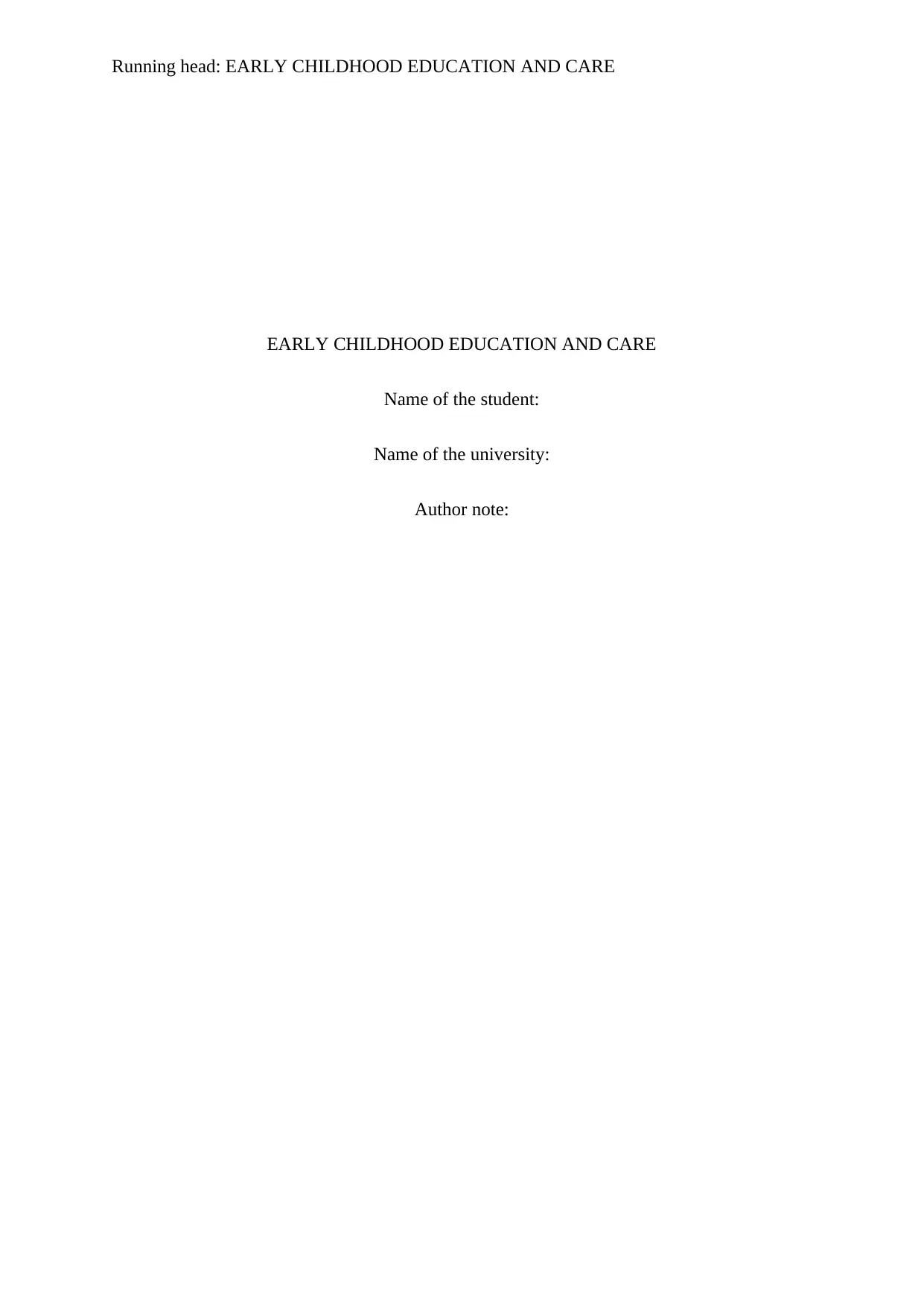
Running head: EARLY CHILDHOOD EDUCATION AND CARE
EARLY CHILDHOOD EDUCATION AND CARE
Name of the student:
Name of the university:
Author note:
EARLY CHILDHOOD EDUCATION AND CARE
Name of the student:
Name of the university:
Author note:
Paraphrase This Document
Need a fresh take? Get an instant paraphrase of this document with our AI Paraphraser
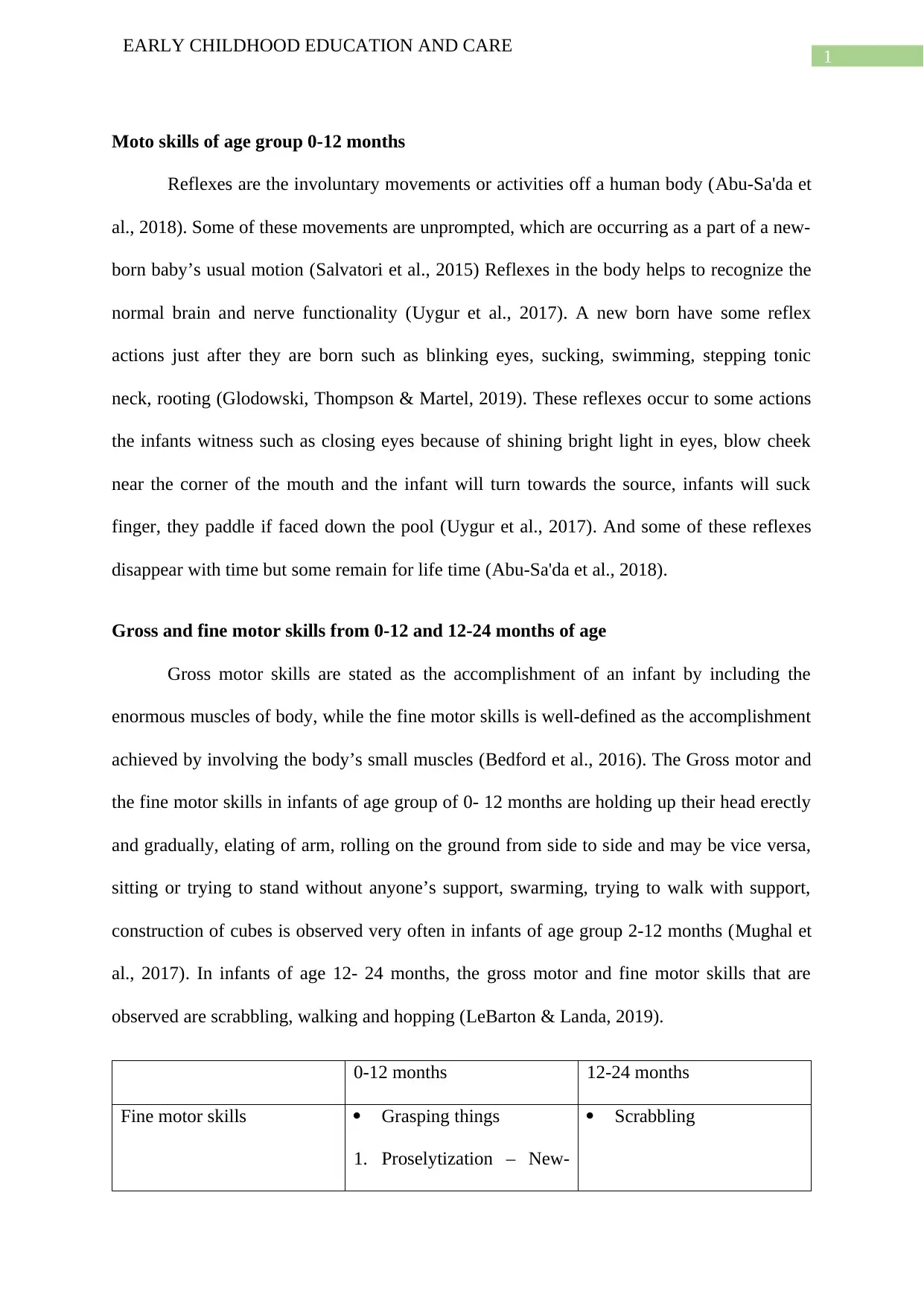
1
EARLY CHILDHOOD EDUCATION AND CARE
Moto skills of age group 0-12 months
Reflexes are the involuntary movements or activities off a human body (Abu-Sa'da et
al., 2018). Some of these movements are unprompted, which are occurring as a part of a new-
born baby’s usual motion (Salvatori et al., 2015) Reflexes in the body helps to recognize the
normal brain and nerve functionality (Uygur et al., 2017). A new born have some reflex
actions just after they are born such as blinking eyes, sucking, swimming, stepping tonic
neck, rooting (Glodowski, Thompson & Martel, 2019). These reflexes occur to some actions
the infants witness such as closing eyes because of shining bright light in eyes, blow cheek
near the corner of the mouth and the infant will turn towards the source, infants will suck
finger, they paddle if faced down the pool (Uygur et al., 2017). And some of these reflexes
disappear with time but some remain for life time (Abu-Sa'da et al., 2018).
Gross and fine motor skills from 0-12 and 12-24 months of age
Gross motor skills are stated as the accomplishment of an infant by including the
enormous muscles of body, while the fine motor skills is well-defined as the accomplishment
achieved by involving the body’s small muscles (Bedford et al., 2016). The Gross motor and
the fine motor skills in infants of age group of 0- 12 months are holding up their head erectly
and gradually, elating of arm, rolling on the ground from side to side and may be vice versa,
sitting or trying to stand without anyone’s support, swarming, trying to walk with support,
construction of cubes is observed very often in infants of age group 2-12 months (Mughal et
al., 2017). In infants of age 12- 24 months, the gross motor and fine motor skills that are
observed are scrabbling, walking and hopping (LeBarton & Landa, 2019).
0-12 months 12-24 months
Fine motor skills Grasping things
1. Proselytization – New-
Scrabbling
EARLY CHILDHOOD EDUCATION AND CARE
Moto skills of age group 0-12 months
Reflexes are the involuntary movements or activities off a human body (Abu-Sa'da et
al., 2018). Some of these movements are unprompted, which are occurring as a part of a new-
born baby’s usual motion (Salvatori et al., 2015) Reflexes in the body helps to recognize the
normal brain and nerve functionality (Uygur et al., 2017). A new born have some reflex
actions just after they are born such as blinking eyes, sucking, swimming, stepping tonic
neck, rooting (Glodowski, Thompson & Martel, 2019). These reflexes occur to some actions
the infants witness such as closing eyes because of shining bright light in eyes, blow cheek
near the corner of the mouth and the infant will turn towards the source, infants will suck
finger, they paddle if faced down the pool (Uygur et al., 2017). And some of these reflexes
disappear with time but some remain for life time (Abu-Sa'da et al., 2018).
Gross and fine motor skills from 0-12 and 12-24 months of age
Gross motor skills are stated as the accomplishment of an infant by including the
enormous muscles of body, while the fine motor skills is well-defined as the accomplishment
achieved by involving the body’s small muscles (Bedford et al., 2016). The Gross motor and
the fine motor skills in infants of age group of 0- 12 months are holding up their head erectly
and gradually, elating of arm, rolling on the ground from side to side and may be vice versa,
sitting or trying to stand without anyone’s support, swarming, trying to walk with support,
construction of cubes is observed very often in infants of age group 2-12 months (Mughal et
al., 2017). In infants of age 12- 24 months, the gross motor and fine motor skills that are
observed are scrabbling, walking and hopping (LeBarton & Landa, 2019).
0-12 months 12-24 months
Fine motor skills Grasping things
1. Proselytization – New-
Scrabbling
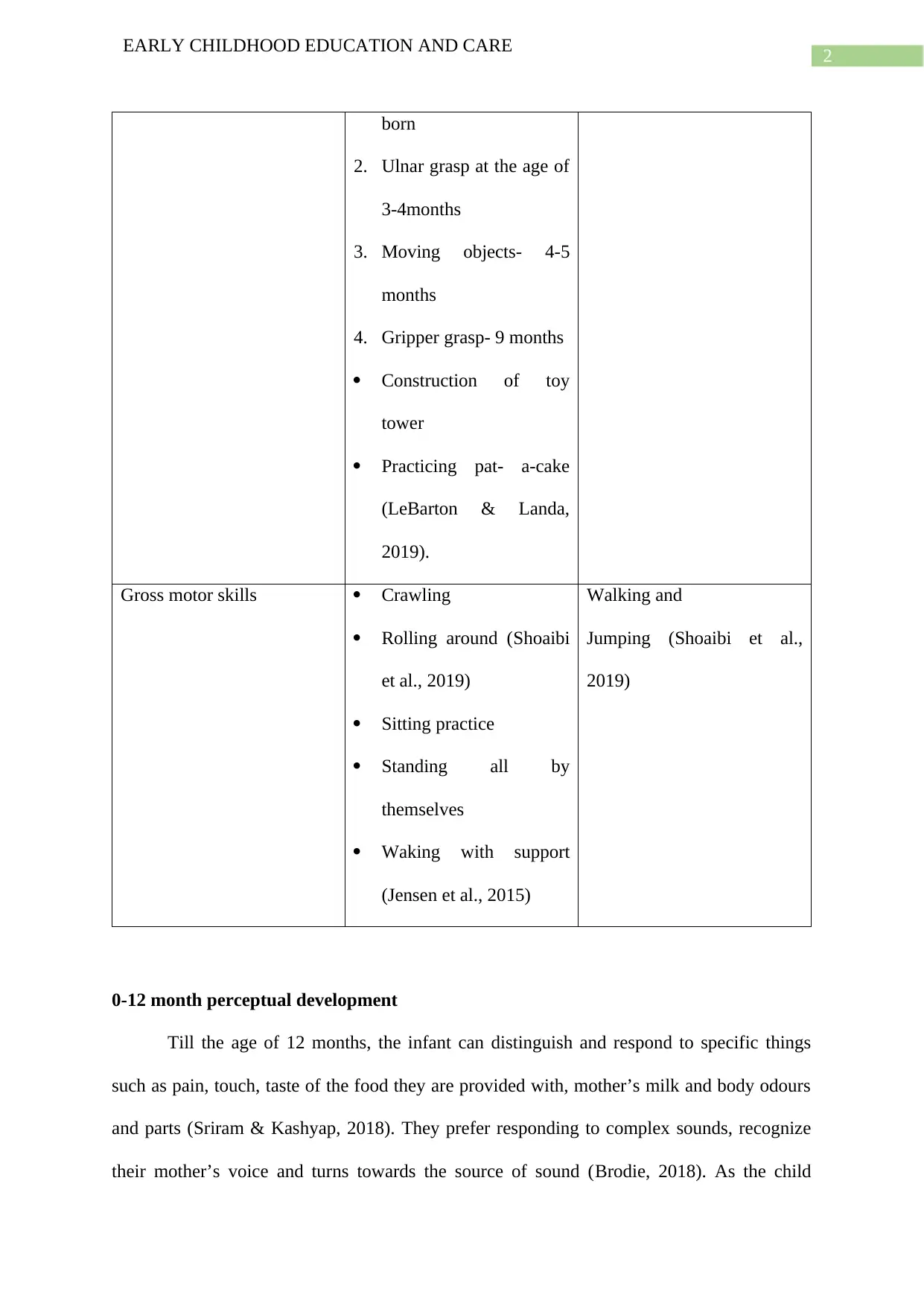
2
EARLY CHILDHOOD EDUCATION AND CARE
born
2. Ulnar grasp at the age of
3-4months
3. Moving objects- 4-5
months
4. Gripper grasp- 9 months
Construction of toy
tower
Practicing pat- a-cake
(LeBarton & Landa,
2019).
Gross motor skills Crawling
Rolling around (Shoaibi
et al., 2019)
Sitting practice
Standing all by
themselves
Waking with support
(Jensen et al., 2015)
Walking and
Jumping (Shoaibi et al.,
2019)
0-12 month perceptual development
Till the age of 12 months, the infant can distinguish and respond to specific things
such as pain, touch, taste of the food they are provided with, mother’s milk and body odours
and parts (Sriram & Kashyap, 2018). They prefer responding to complex sounds, recognize
their mother’s voice and turns towards the source of sound (Brodie, 2018). As the child
EARLY CHILDHOOD EDUCATION AND CARE
born
2. Ulnar grasp at the age of
3-4months
3. Moving objects- 4-5
months
4. Gripper grasp- 9 months
Construction of toy
tower
Practicing pat- a-cake
(LeBarton & Landa,
2019).
Gross motor skills Crawling
Rolling around (Shoaibi
et al., 2019)
Sitting practice
Standing all by
themselves
Waking with support
(Jensen et al., 2015)
Walking and
Jumping (Shoaibi et al.,
2019)
0-12 month perceptual development
Till the age of 12 months, the infant can distinguish and respond to specific things
such as pain, touch, taste of the food they are provided with, mother’s milk and body odours
and parts (Sriram & Kashyap, 2018). They prefer responding to complex sounds, recognize
their mother’s voice and turns towards the source of sound (Brodie, 2018). As the child
⊘ This is a preview!⊘
Do you want full access?
Subscribe today to unlock all pages.

Trusted by 1+ million students worldwide
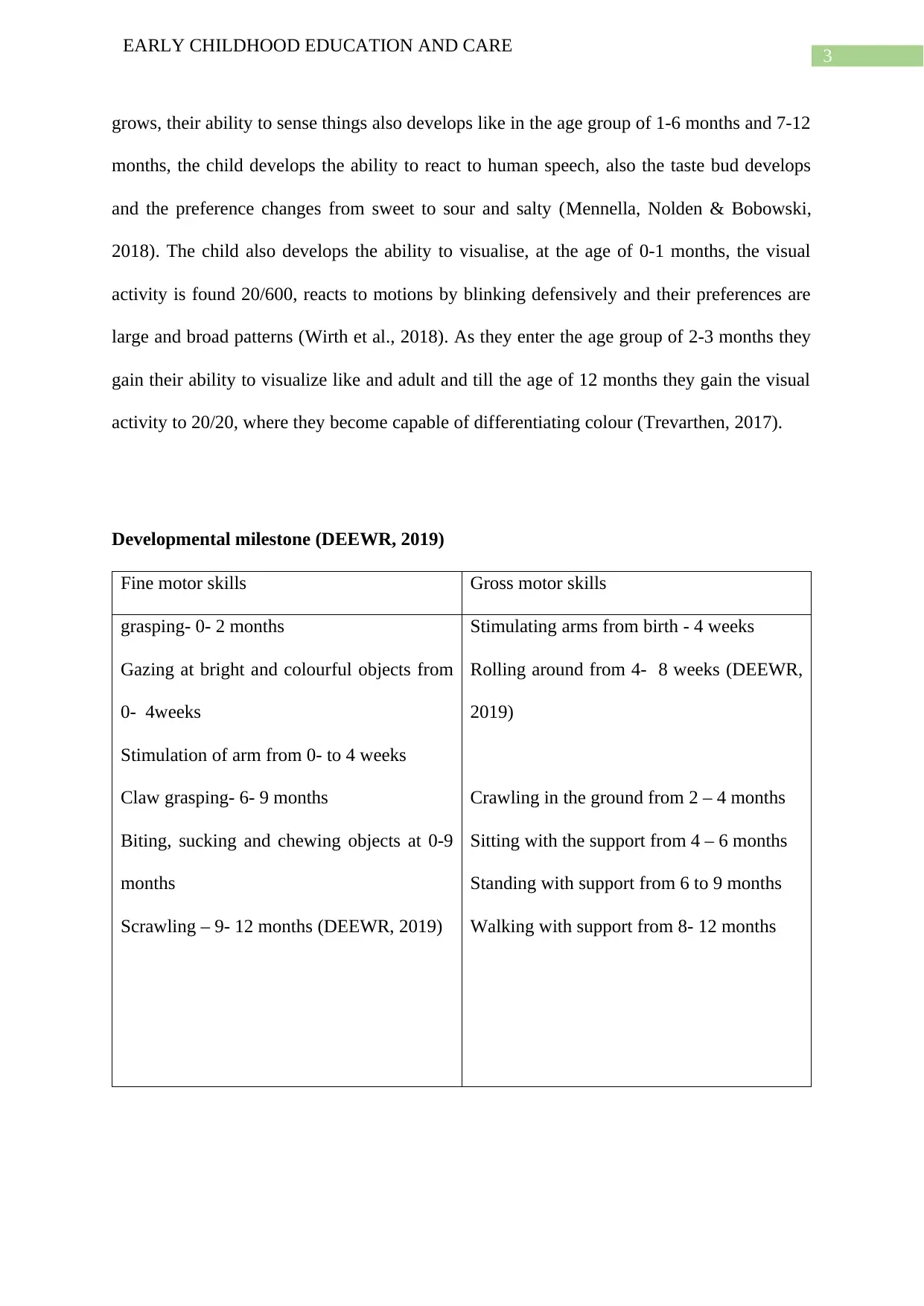
3
EARLY CHILDHOOD EDUCATION AND CARE
grows, their ability to sense things also develops like in the age group of 1-6 months and 7-12
months, the child develops the ability to react to human speech, also the taste bud develops
and the preference changes from sweet to sour and salty (Mennella, Nolden & Bobowski,
2018). The child also develops the ability to visualise, at the age of 0-1 months, the visual
activity is found 20/600, reacts to motions by blinking defensively and their preferences are
large and broad patterns (Wirth et al., 2018). As they enter the age group of 2-3 months they
gain their ability to visualize like and adult and till the age of 12 months they gain the visual
activity to 20/20, where they become capable of differentiating colour (Trevarthen, 2017).
Developmental milestone (DEEWR, 2019)
Fine motor skills Gross motor skills
grasping- 0- 2 months
Gazing at bright and colourful objects from
0- 4weeks
Stimulation of arm from 0- to 4 weeks
Claw grasping- 6- 9 months
Biting, sucking and chewing objects at 0-9
months
Scrawling – 9- 12 months (DEEWR, 2019)
Stimulating arms from birth - 4 weeks
Rolling around from 4- 8 weeks (DEEWR,
2019)
Crawling in the ground from 2 – 4 months
Sitting with the support from 4 – 6 months
Standing with support from 6 to 9 months
Walking with support from 8- 12 months
EARLY CHILDHOOD EDUCATION AND CARE
grows, their ability to sense things also develops like in the age group of 1-6 months and 7-12
months, the child develops the ability to react to human speech, also the taste bud develops
and the preference changes from sweet to sour and salty (Mennella, Nolden & Bobowski,
2018). The child also develops the ability to visualise, at the age of 0-1 months, the visual
activity is found 20/600, reacts to motions by blinking defensively and their preferences are
large and broad patterns (Wirth et al., 2018). As they enter the age group of 2-3 months they
gain their ability to visualize like and adult and till the age of 12 months they gain the visual
activity to 20/20, where they become capable of differentiating colour (Trevarthen, 2017).
Developmental milestone (DEEWR, 2019)
Fine motor skills Gross motor skills
grasping- 0- 2 months
Gazing at bright and colourful objects from
0- 4weeks
Stimulation of arm from 0- to 4 weeks
Claw grasping- 6- 9 months
Biting, sucking and chewing objects at 0-9
months
Scrawling – 9- 12 months (DEEWR, 2019)
Stimulating arms from birth - 4 weeks
Rolling around from 4- 8 weeks (DEEWR,
2019)
Crawling in the ground from 2 – 4 months
Sitting with the support from 4 – 6 months
Standing with support from 6 to 9 months
Walking with support from 8- 12 months
Paraphrase This Document
Need a fresh take? Get an instant paraphrase of this document with our AI Paraphraser
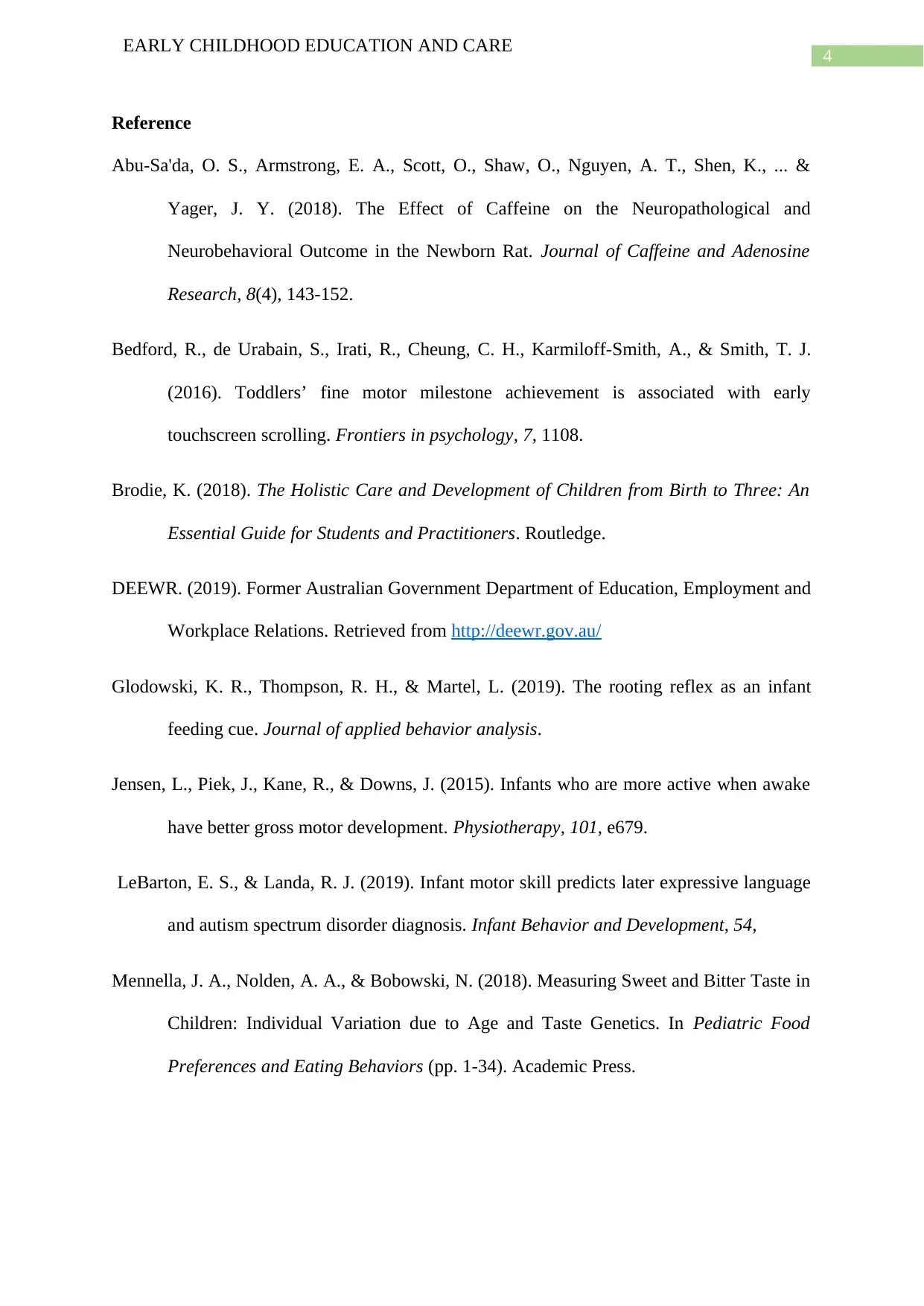
4
EARLY CHILDHOOD EDUCATION AND CARE
Reference
Abu-Sa'da, O. S., Armstrong, E. A., Scott, O., Shaw, O., Nguyen, A. T., Shen, K., ... &
Yager, J. Y. (2018). The Effect of Caffeine on the Neuropathological and
Neurobehavioral Outcome in the Newborn Rat. Journal of Caffeine and Adenosine
Research, 8(4), 143-152.
Bedford, R., de Urabain, S., Irati, R., Cheung, C. H., Karmiloff-Smith, A., & Smith, T. J.
(2016). Toddlers’ fine motor milestone achievement is associated with early
touchscreen scrolling. Frontiers in psychology, 7, 1108.
Brodie, K. (2018). The Holistic Care and Development of Children from Birth to Three: An
Essential Guide for Students and Practitioners. Routledge.
DEEWR. (2019). Former Australian Government Department of Education, Employment and
Workplace Relations. Retrieved from http://deewr.gov.au/
Glodowski, K. R., Thompson, R. H., & Martel, L. (2019). The rooting reflex as an infant
feeding cue. Journal of applied behavior analysis.
Jensen, L., Piek, J., Kane, R., & Downs, J. (2015). Infants who are more active when awake
have better gross motor development. Physiotherapy, 101, e679.
LeBarton, E. S., & Landa, R. J. (2019). Infant motor skill predicts later expressive language
and autism spectrum disorder diagnosis. Infant Behavior and Development, 54,
Mennella, J. A., Nolden, A. A., & Bobowski, N. (2018). Measuring Sweet and Bitter Taste in
Children: Individual Variation due to Age and Taste Genetics. In Pediatric Food
Preferences and Eating Behaviors (pp. 1-34). Academic Press.
EARLY CHILDHOOD EDUCATION AND CARE
Reference
Abu-Sa'da, O. S., Armstrong, E. A., Scott, O., Shaw, O., Nguyen, A. T., Shen, K., ... &
Yager, J. Y. (2018). The Effect of Caffeine on the Neuropathological and
Neurobehavioral Outcome in the Newborn Rat. Journal of Caffeine and Adenosine
Research, 8(4), 143-152.
Bedford, R., de Urabain, S., Irati, R., Cheung, C. H., Karmiloff-Smith, A., & Smith, T. J.
(2016). Toddlers’ fine motor milestone achievement is associated with early
touchscreen scrolling. Frontiers in psychology, 7, 1108.
Brodie, K. (2018). The Holistic Care and Development of Children from Birth to Three: An
Essential Guide for Students and Practitioners. Routledge.
DEEWR. (2019). Former Australian Government Department of Education, Employment and
Workplace Relations. Retrieved from http://deewr.gov.au/
Glodowski, K. R., Thompson, R. H., & Martel, L. (2019). The rooting reflex as an infant
feeding cue. Journal of applied behavior analysis.
Jensen, L., Piek, J., Kane, R., & Downs, J. (2015). Infants who are more active when awake
have better gross motor development. Physiotherapy, 101, e679.
LeBarton, E. S., & Landa, R. J. (2019). Infant motor skill predicts later expressive language
and autism spectrum disorder diagnosis. Infant Behavior and Development, 54,
Mennella, J. A., Nolden, A. A., & Bobowski, N. (2018). Measuring Sweet and Bitter Taste in
Children: Individual Variation due to Age and Taste Genetics. In Pediatric Food
Preferences and Eating Behaviors (pp. 1-34). Academic Press.
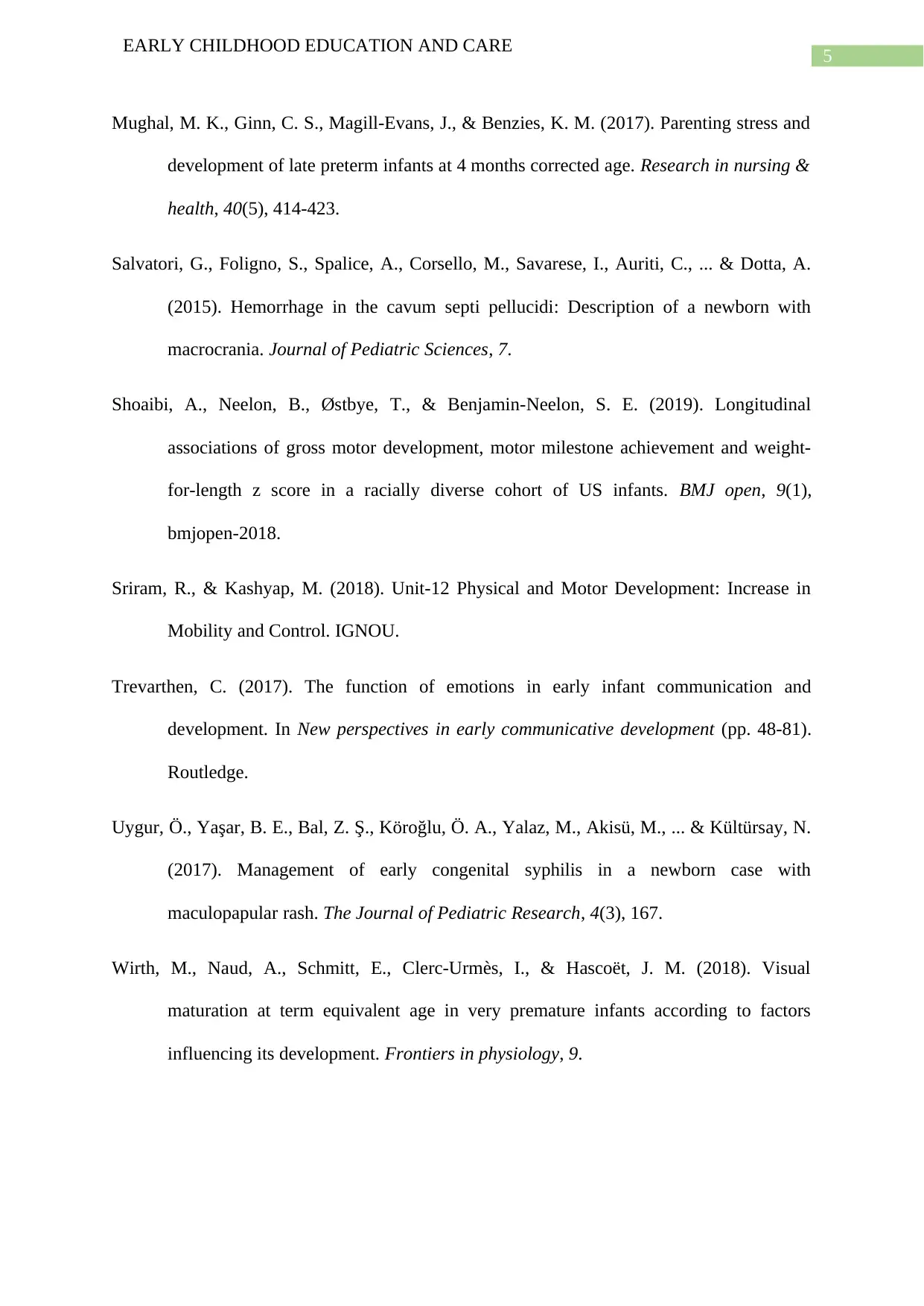
5
EARLY CHILDHOOD EDUCATION AND CARE
Mughal, M. K., Ginn, C. S., Magill‐Evans, J., & Benzies, K. M. (2017). Parenting stress and
development of late preterm infants at 4 months corrected age. Research in nursing &
health, 40(5), 414-423.
Salvatori, G., Foligno, S., Spalice, A., Corsello, M., Savarese, I., Auriti, C., ... & Dotta, A.
(2015). Hemorrhage in the cavum septi pellucidi: Description of a newborn with
macrocrania. Journal of Pediatric Sciences, 7.
Shoaibi, A., Neelon, B., Østbye, T., & Benjamin-Neelon, S. E. (2019). Longitudinal
associations of gross motor development, motor milestone achievement and weight-
for-length z score in a racially diverse cohort of US infants. BMJ open, 9(1),
bmjopen-2018.
Sriram, R., & Kashyap, M. (2018). Unit-12 Physical and Motor Development: Increase in
Mobility and Control. IGNOU.
Trevarthen, C. (2017). The function of emotions in early infant communication and
development. In New perspectives in early communicative development (pp. 48-81).
Routledge.
Uygur, Ö., Yaşar, B. E., Bal, Z. Ş., Köroğlu, Ö. A., Yalaz, M., Akisü, M., ... & Kültürsay, N.
(2017). Management of early congenital syphilis in a newborn case with
maculopapular rash. The Journal of Pediatric Research, 4(3), 167.
Wirth, M., Naud, A., Schmitt, E., Clerc-Urmès, I., & Hascoët, J. M. (2018). Visual
maturation at term equivalent age in very premature infants according to factors
influencing its development. Frontiers in physiology, 9.
EARLY CHILDHOOD EDUCATION AND CARE
Mughal, M. K., Ginn, C. S., Magill‐Evans, J., & Benzies, K. M. (2017). Parenting stress and
development of late preterm infants at 4 months corrected age. Research in nursing &
health, 40(5), 414-423.
Salvatori, G., Foligno, S., Spalice, A., Corsello, M., Savarese, I., Auriti, C., ... & Dotta, A.
(2015). Hemorrhage in the cavum septi pellucidi: Description of a newborn with
macrocrania. Journal of Pediatric Sciences, 7.
Shoaibi, A., Neelon, B., Østbye, T., & Benjamin-Neelon, S. E. (2019). Longitudinal
associations of gross motor development, motor milestone achievement and weight-
for-length z score in a racially diverse cohort of US infants. BMJ open, 9(1),
bmjopen-2018.
Sriram, R., & Kashyap, M. (2018). Unit-12 Physical and Motor Development: Increase in
Mobility and Control. IGNOU.
Trevarthen, C. (2017). The function of emotions in early infant communication and
development. In New perspectives in early communicative development (pp. 48-81).
Routledge.
Uygur, Ö., Yaşar, B. E., Bal, Z. Ş., Köroğlu, Ö. A., Yalaz, M., Akisü, M., ... & Kültürsay, N.
(2017). Management of early congenital syphilis in a newborn case with
maculopapular rash. The Journal of Pediatric Research, 4(3), 167.
Wirth, M., Naud, A., Schmitt, E., Clerc-Urmès, I., & Hascoët, J. M. (2018). Visual
maturation at term equivalent age in very premature infants according to factors
influencing its development. Frontiers in physiology, 9.
⊘ This is a preview!⊘
Do you want full access?
Subscribe today to unlock all pages.

Trusted by 1+ million students worldwide
1 out of 6
Related Documents
Your All-in-One AI-Powered Toolkit for Academic Success.
+13062052269
info@desklib.com
Available 24*7 on WhatsApp / Email
![[object Object]](/_next/static/media/star-bottom.7253800d.svg)
Unlock your academic potential
Copyright © 2020–2026 A2Z Services. All Rights Reserved. Developed and managed by ZUCOL.





